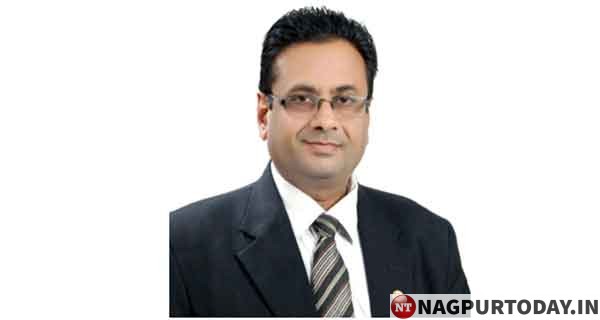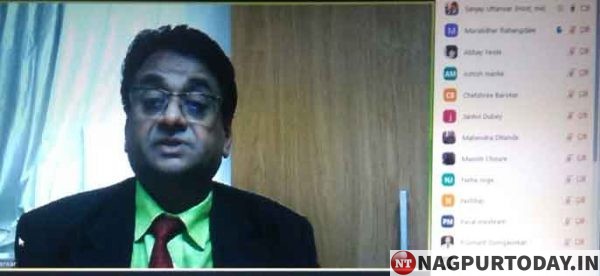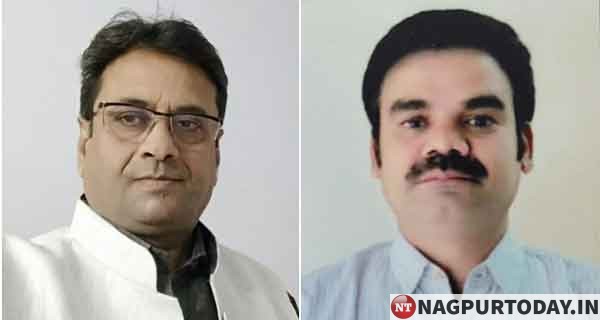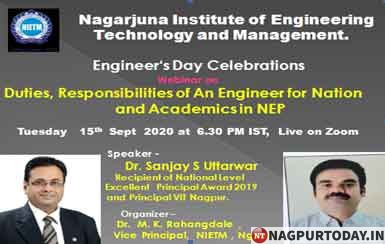
Nagarjuna Institute of Engineering Technology and Management Nagpur , has arranged Webinar of Dr. Sanjay S Uttarwar , Renowned Academician and social worker from Nagpur on topic “ Duties and Responsibilities of an Engineer toward Nation and Academics in NEP 2020 “ Live on Zoom platform. Event was celebration of Engineers Day
Dr. Sanjay Uttarwar Nationally renowned academician and Principal of VIT Engineering College from Nagpur was key note speaker for webinar.
Majority of people from Academic field, parents , students around the globe was on line for the webinar. At the beginning organizer Dr. M K Rahangdale and Dr. Kelo Principal NIETM , pay tribute to great Engineer of century late Bharatratna Mokshagundam Visvesvaraya, in whose memory we all are celebrating Engineers Day. Later he introduce Speaker and welcome all on line participants.
Webinar starts with the present condition of Academic field. Speaker share present status of academics with gathering. He gave brief idea about societies expectations from teacher and Engineer as a whole.
Dr Sanjay S Uttarwar is a renowned Academician of central India and in this field since last thirty three years. He has proved his expertise by serving renowned educational groups of Maharashtra and MP.
In the beginning of his career he was Entrepreneur and was having his manufacturing unit in MIDC Yavatmal. In 1995 he switchover to teaching line and has started his career as a full fledge teacher at BNCOE Sevagram Wardha. Later he shifted to Nagpur and has done Post graduation and PhD from Visvesvaraya National Institite of Technology Nagpur
In Mechanical Engineering. He has served renowned educational groups from Maharashtra and MP in various Capacities. From Last eight years he is working as Principal of Engineering College. He is recipient of seven National and International Level Awards for his outstanding contribution to the field of academics and research.

He has visited UK, Singapore, China to present research papers in International Conferences. He is having sixty research papers to his credit which are published in International Journals and Conferences. He is a renowned Motivational Speaker from region and is frequently invited by TV Channels, Radio and Educational Institutes for delivering lectures on various motivational topics. In addition to it he is a popular singer from Nagpur and has performed at various musical concerts which took place at auditoriums of Nagpur.
In his delivery Dr. Uttarwar high light the life span of Sir Mokshgundam Visvesvaraya and his achievements in life and has paid tribute to great Engineer of our country. He elaborate the importance of noble work teaching to the audience. He gives tips to the audience regarding effective teaching in class room. He says that teaching should be treated as mission in hand rather than routine boring work. Teacher should constantly update himself or herself to fulfill demands of todays smart generation. Todays students are very smart and they easily understood the concept of topic. Todays young generation is computer and mobile experts . They know how to do its effective use of it and that’s why teacher should cope up himself or herself with the demand of hour. The days of old black board teaching are diminishing day by day. Now it’s a virtual world , every thing is going by online and because of which teacher should be smart enough to understand and assess requirements of coming days. .
While explaining the role of Engineer he says that we are in need of hundreds of Visvesvaraya to develop our country and make it a super power. He explain the abilities of an Engineer for logical thinking and expertise in designing and developing of product and concept.

Dr. Uttarwar further says that, The world is undergoing rapid changes in the knowledge landscape. With various dramatic scientific and technological advances, such as the rise of big data, machine learning, and artificial intelligence, many unskilled jobs worldwide may be taken over by machines, while the need for a skilled workforce, particularly involving mathematics, computer science, and data science, in conjunction with multidisciplinary abilities across the sciences, social sciences, and humanities, will be increasingly in greater demand. With climate change, increasing pollution, and depleting natural resources, there will be a sizeable shift in how we meet the world’s energy, water, food, and sanitation needs, again resulting in the need for new skilled labour, particularly in biology, chemistry, physics, agriculture, climate science, and social science. The growing emergence of epidemics and pandemics will also call for collaborative research in infectious disease management and development of vaccines and the resultant social issues heightens the need for multidisciplinary learning. There will be a growing demand for humanities and art, as India moves towards becoming a developed country as well as among the three largest economies in the world . The gap between the current state of learning outcomes and what is required must be bridged through undertaking major reforms that bring the highest quality, equity, and integrity into the system, from early childhood care and education through higher education
In National Education Policy 2020 , which is going to implemented from coming session, has totally changed the role of teacher. Teacher should not confine him to his field only. He should possesses the all round knowledge to fulfill demand of hour. So the role of teacher in coming days is very crucial to frame the future of India. He further elaborate about ancient education system of our country. The rich heritage of ancient and eternal Indian knowledge and thought has been a guiding light for this Policy. The pursuit of knowledge (Jnan), wisdom (Pragyaa), and truth (Satya) was always considered in Indian thought and philosophy as the highest human goal.

The aim of education in ancient India was not just the acquisition of knowledge as preparation for life in this world, or life beyond schooling, but for the complete realization and liberation of the self. World-class institutions of ancient India such as Takshashila, Nalanda,Vikramshila, Vallabhi, set the highest standards of multidisciplinary teaching and research and hosted scholars and students from across backgrounds and countries. The Indian education system produced great scholars such as Charaka, Susruta, Aryabhata, Varahamihira, Bhaskaracharya, Brahmagupta, Chanakya, Chakrapani Datta, Madhava, Panini, Patanjali, Nagarjuna, Gautama, Pingala, Sankardev, Maitreyi, Gargi and Thiruvalluvar, among numerous others, who made seminal contributions to world knowledge in diverse fields such as mathematics, astronomy, metallurgy, medical science and surgery, civil engineering, architecture, shipbuilding and navigation, yoga, fine arts, chess, and more.
Indian culture and philosophy have had a strong influence on the world. These rich legacies to world heritage must not only be nurtured and preserved for posterity but also researched, enhanced, and put to new uses through our education system. The new education policy must provide to all students, irrespective of their place of residence, a quality education system, with particular focus on historically marginalized, disadvantaged, and underrepresented groups. Education is a great leveler and is the best tool for achieving economic and social mobility, inclusion, and equality. Initiatives must be in place to ensure that all students from such groups, despite inherent obstacles, are provided various targeted opportunities to enter and excel in the educational system.

These elements must be incorporated taking into account the local and global needs of the country, and with a respect for and deference to its rich diversity and culture. Instilling knowledge of India and its varied social, cultural, and technological needs, its inimitable artistic, language, and knowledge traditions, and its strong ethics in India’s young people is considered critical for purposes of national pride, self-confidence, self-knowledge, cooperation, and integration.
Later Dr. Uttarwar explain the pripciples of NEP2020 in detail to the audience. This policy envisages that the extant 10+2 structure in school education will be modified with a new pedagogical and curricular restructuring of 5+3+3+4 covering ages 3-18 . Currently, children in the age group of 3-6 are not covered in the 10+2 structure as Class 1 begins at age 6. In the new 5+3+3+4 structure, a strong base of Early Childhood Care and Education (ECCE) from age 3 is also included, which is aimed at promoting better overall learning, development, and well-being.
During his lucid delivery, Dr. Uttarwar recite a poem by title “Hey Engineer “ written by him and received lot off applaud from audience.
Organiser Dr. M K Rahangdale, in his concluding remarks talks about the present scenario of academics which takes place at colleges. . He himself is also a Vice Principal of NIETM..
Later on Question and answer session Dr. Sanjay Uttarwar gave answers to the questions asked by audience. Dr. Raahandale , Dr. Salim Chavan, Dr. Sanjay Badjate, Dr. Ravindra Kshirsagar, Dr. Rajesh Padhey, Dr. Joshi, Mrs. Kirti Nagose, Mrs. Kirti Labhsetwar, Dr. Pradeep jadhav, .Mr. Sanjay Upganlawar,
Dr. Deshmukh, , Shantanu Uttarwar , , Vijay Puranik, Dr. Chaudhary, Dr. Pande, Dr. Varsha Uttarwar and many more students and staff were participants Asks their doubts for betterment of Education sector and has expressed their views during webinar. Audience loudly appreciate the delivery of Dr. S S Uttarwar and gave thanks to him for throwing .light on NEP 2020 .
Mr. M K Rahangdale express her gratitude towards Speaker and all on line guests and propose Vote of Thanks. Webinar conclude at 7.45 PM.























